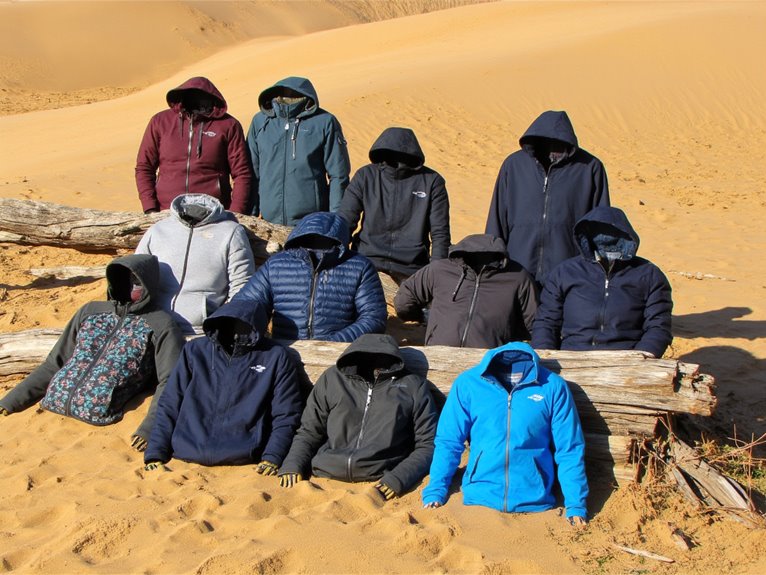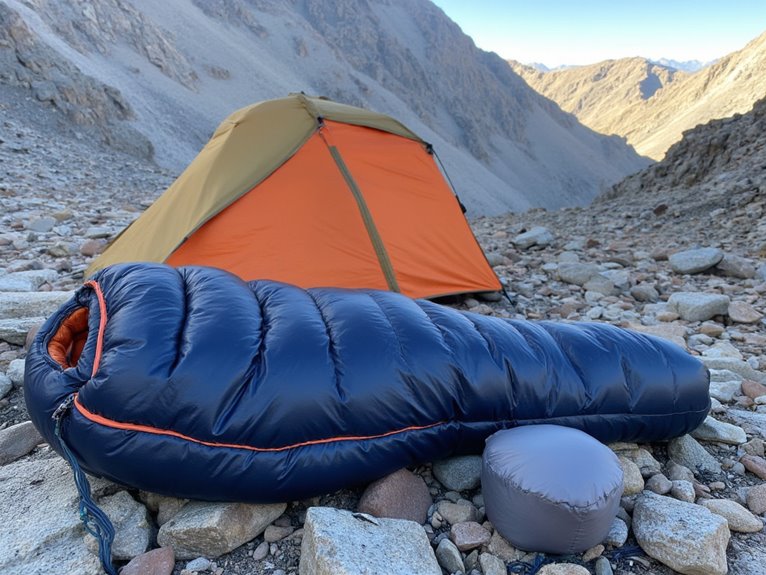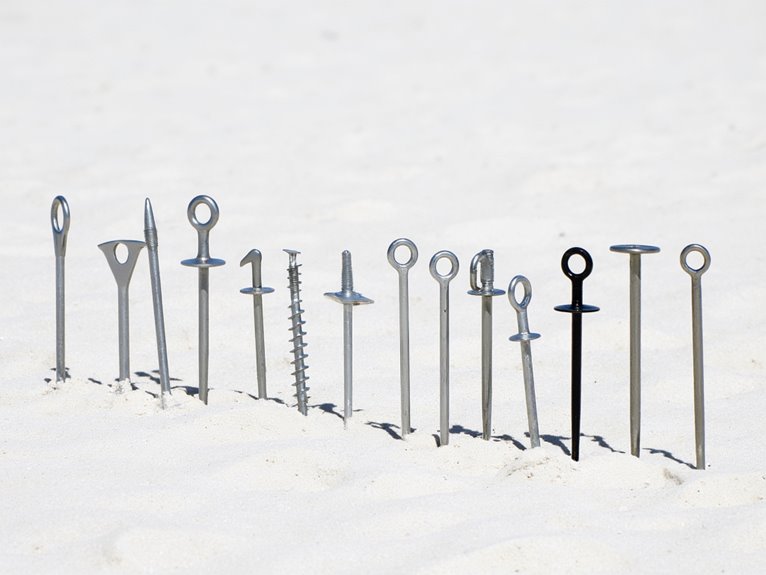What Is the Ideal Pack Weight for Jmt?
Optimizing pack weight is vital for a comfortable and successful John Muir Trail thru-hike. Aim for a base weight of 20-25 pounds and a total pack weight of 35-40 pounds, including food and water. This ideal target allows for a comfortable and sustainable hiking pace. By making deliberate gear choices, prioritizing functionality, durability, and weight, you can achieve a well-planned pack weight. Learn how to balance weight with durability, comfort, and accessibility to guarantee a successful thru-hike, and discover the key strategies to achieve the ideal pack weight for your John Muir Trail adventure.
We are supported by our audience. When you purchase through links on our site, we may earn an affiliate commission, at no extra cost for you. Learn more. Last update on 15th January 2026 / Images from Amazon Product Advertising API.
Understanding Pack Weight Basics
Optimizing pack weight is a delicate balancing act between carrying essential gear and minimizing the physical burden, as every ounce counts when traversing the John Muir Trail.
A well-planned pack weight can make all the difference in a hiker's comfort level and overall experience. Striking a balance between carrying the necessary gear and avoiding unnecessary weight is crucial.
A good rule of thumb is to aim for a base weight of 20-25 pounds, with a total pack weight of 35-40 pounds, including food and water. This allows for a comfortable and sustainable hiking pace while still providing the necessary gear for a safe and enjoyable journey.
JMT Hiker Profiles and Their Needs
Different hiker profiles have distinct needs and priorities in respect to pack weight, highlighting the importance of understanding individual requirements for a successful John Muir Trail thru-hike.
For example, section hikers may prioritize lightweight gear for shorter trips, while thru-hikers may need to balance weight with durability and comfort for extended periods.
Ultralight enthusiasts focus on minimizing weight, often sacrificing comfort and convenience.
Family hikers and those with mobility issues may require additional gear for safety and accessibility.
Understanding these varying needs helps tailor pack weight strategies to meet individual goals and guarantee a successful JMT journey.
Gear Choices and Their Impact
Every pound shed from a hiker's pack can translate to increased endurance and reduced fatigue on the John Muir Trail, making deliberate gear choices crucial in achieving an ideal pack weight.
When selecting gear, JMT hikers should prioritize functionality, durability, and weight.
A lightweight tent, sleeping bag, and pad can save substantial weight without sacrificing comfort.
Additionally, consider a portable stove and fuel-efficient cooking pot to minimize cooking weight.
Clothing choices should prioritize quick-drying, moisture-wicking fabrics and multi-use items to reduce overall pack weight.
Food and Water Weight Considerations
Properly planning and packing food and water supplies is critical to minimizing pack weight, as these essentials can quickly add up to a significant burden on the JMT hiker.
A common mistake is overpacking food, resulting in unnecessary weight.
Aim to pack lightweight, high-calorie foods and consider dehydrating meals to reduce weight and volume.
Water weight can also be significant, so plan to refill at water sources along the trail.
Bring a water treatment system or filter to minimize the need for heavy water bottles.
Shelter and Sleeping Gear Options
In the realm of shelter and sleeping gear, hikers on the John Muir Trail (JMT) must strike a balance between comfort, protection, and pack weight.
The choice of tent and tarp options, as well as sleeping bag choices, substantially impact the overall weight and bulk of one's pack.
Tent and Tarp Options
For thru-hikers on the John Muir Trail, selecting the right shelter and sleeping gear is crucial, as it can greatly impact overall pack weight and comfort.
When tackling the decision of tent and tarp options, thru-hikers have several choices to weigh. Tarps offer a lightweight and minimalist approach, providing adequate protection from the elements while keeping pack weight to a minimum.
On the other hand, tents provide more thorough protection and can be a better option for thru-hikers who prioritize comfort and weather resistance.
Popular tent options for the JMT include the Big Agnes Fly Creek HV UL 2, the MSR Elixir 2, and the Zpacks Duplex.
When choosing a tent or tarp, thru-hikers should ponder factors such as weight, durability, and weather resistance to guarantee they find the right balance for their JMT thru-hike.
Sleeping Bag Choices
Selecting a suitable sleeping bag is a vital decision for John Muir Trail thru-hikers, as it directly impacts the overall comfort, safety, and pack weight of their adventure.
When choosing a sleeping bag, consider the lowest temperature you expect to encounter on the trail and select a bag with a comfort rating at or below that temperature.
Look for bags with high-quality insulation, such as down or synthetic fills, and a water-resistant treatment to protect against moisture.
Additionally, consider the bag's compressibility and weight to guarantee it fits within your pack weight goals.
Ultimately, a well-chosen sleeping bag will provide a restful night's sleep, allowing you to tackle the trail with energy and enthusiasm.
Personal Hygiene and First Aid Items
In the realm of personal hygiene and first aid items, backpackers must strike a balance between packing essentials and minimizing weight.
Toiletry essentials, such as biodegradable soap and toilet paper, are must-haves for maintaining personal hygiene on the trail.
A well-stocked first aid kit should include items like bandages, antiseptic wipes, and pain relievers to address minor injuries and ailments.
Toiletry Essentials
A prudent backpacker allocates approximately 1-2 pounds of pack weight to toiletry essentials, encompassing personal hygiene and first aid items that are vital to maintaining health and comfort on the John Muir Trail.
These essentials include biodegradable soap, toilet paper, hand sanitizer, and any personal hygiene items specific to individual needs.
A small supply of baby wipes, dental care items, and feminine hygiene products (if applicable) should also be considered.
Keeping these items to a minimum is essential to maintaining a lightweight pack while still ensuring personal comfort and hygiene.
Personal First Aid
Personal first aid kits for the John Muir Trail should prioritize items that treat wounds, manage pain, and prevent infection, as these are the most critical health concerns on a multi-day backpacking trip.
A well-stocked first aid kit can help mitigate minor injuries and prevent more serious complications.
Antiseptic wipes and antibiotic ointment for wound cleaning and infection prevention
Assorted bandages and band-aids for wound dressing
Pain relievers such as ibuprofen or acetaminophen for pain management
Antihistamines for allergic reactions
Blister care items, including moleskin and blister pads, to prevent and treat blisters
Electronic devices, including GPS units, satellite phones, and portable power banks, are essential components of a well-curated pack for a successful John Muir Trail (JMT) thru-hike.
These tools enable hikers to navigate the 211-mile trail, communicate with the outside world, and stay powered up throughout their journey.
When selecting electronics, consider the weight, durability, and water resistance of each device.
Look for GPS units with pre-loaded JMT maps and satellite phones with reliable coverage in remote areas.
Portable power banks should be compact, lightweight, and capable of charging devices multiple times.
Clothing and Layering Strategies
Each hiker's clothing and layering strategy plays a critical role in maintaining a comfortable body temperature and preventing weather-related illnesses during a John Muir Trail thru-hike.
A well-planned clothing system can make a significant difference in overall hiking comfort and safety.
Choose breathable, moisture-wicking fabrics for base layers.
Select insulating mid-layers that provide warmth without excess bulk.
Invest in a waterproof and breathable outer layer.
Consider a hat and gloves for cold weather conditions.
Pack extra socks and underwear for comfort and hygiene.
Achieving the Ideal Pack Weight
A well-curated backpack weighing between 30-40 pounds can make a substantial difference in a hiker's overall comfort and endurance on a John Muir Trail thru-hike.
Achieving the ideal pack weight requires a thoughtful and intentional approach to gear selection.
Start by identifying essential items and eliminating non-essential ones. Opt for lightweight alternatives and consider multi-use gear to reduce overall weight.
Additionally, adopt a 'less is more' mindset regarding clothing, focusing on versatile, quick-drying pieces that can be layered for varying conditions.



